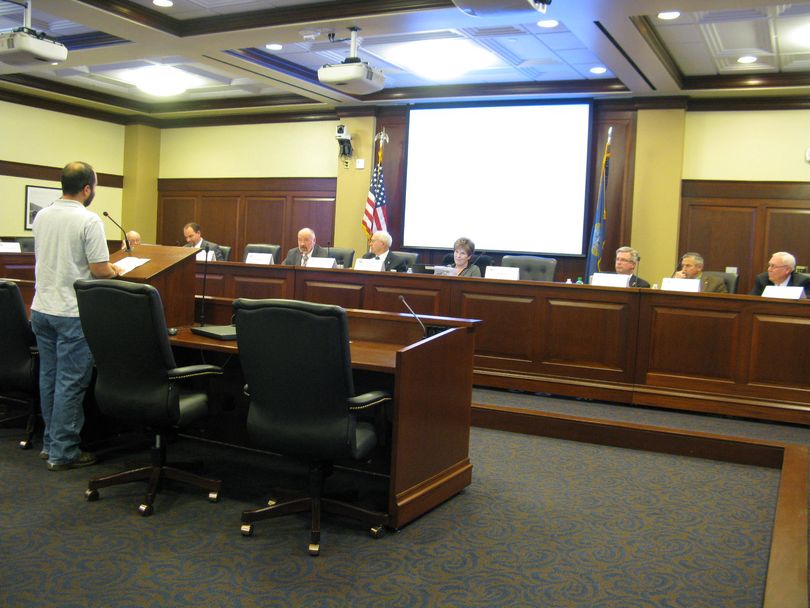State worker pay hearing: ‘I’m glad to report I’m no longer getting food stamps’

More than 30 state employees have submitted written testimony to the joint legislative committee on Change in Employee Compensation; that’s in addition to a half-dozen or so who have signed up to testify in person this afternoon.
First up today was Stacy Pearson, vice president for finance and administration at Boise State University. “Thank you for reconvening,” she told the lawmakers, “because compensation is so very, very important to our state as well as our university. And thank you so much for supporting the 3 percent CEC last year. It made a significant difference.”
She said since 2014, BSU was able to target the 3 percent merit raises that lawmakers approved last year to give a $1 per hour increase in the minimum salary for its classified employees, from $9 to $10 an hour. That impacted 69 current employees, and BSU saw its turnover rate among classified employees drop from 23 percent in 2014 to 14 percent in 2015.
Jake Thibodeau, a custodian at BSU, told the committee he’s here on his own time. “My shift doesn’t start until 5,” he said. After last year’s raise, he said, “I’m glad to report that I am no longer getting food stamps. … My custodial co-workers at Boise State were very much affected by that.”
Among those submitting written comments were Jason Bradfish, who works for the Department of Health & Welfare in Coeur d’Alene; he wrote that he’s approaching his 9th year of employment with the department, and most years has gotten no raise but an increase in health insurance costs. “As inflation drives up costs of groceries, mortgages, medical expenses, car repair expenses coupled with the vast majority of other Idaho citizens getting a raise, it is equal to a cut in pay per year to work for the Idaho state,” he wrote.
Randy Tucker, a financial technician at BSU, wrote, “It’s very disappointing that the state Legislature uses state employees as tools to balance the state budget.” Megan Davis, who works for the state Department of Juvenile Corrections in St. Anthony, wrote, “I have been involved in a number of restraints, been placed in potentially dangerous situations, stayed long hours at the cottage, worked overtime, covered shifts, stayed at work until my job is complete, and I have absolutely done this without complaining.” But, she wrote, “I feel like we are under paid. … If pay was increased, then I feel like more employees would be motivated to make this job a career.”
Marly MacDonald, a 25-year state employee who works with children with disabilities for the Idaho Infant Toddler Program in Nampa, wrote, “It has been very difficult living on the state salary these years, and honestly, if I weren’t married, I don’t think I could have afforded to stay with the state, but would have had to leave for the private sector. I stay with the state because I love the job and I believe in our mission so much.”
Wrote Heath Wade, a six-year juvenile corrections employee, "The hardest part about staying in the corrections field for me is the pay. I have friends and family who make $5 to $10 more an hour for not nearly as important work as we are trying to accomplish here. We are trying to build the youth of this state and country to be productive citizens, and keep others safe from harm or fear. My brother-in-law is a weed sprayer for the county, and makes $4 an hour more than I do."
Donna Yule of the Idaho Public Employees Association told the lawmakers, “We all know right now that state employees are grossly underpaid in comparison to people doing comparable work in the private sector, and in comparison to public employees in surrounding states.” She asked lawmakers to “get our pay scale up to where it should be,” and said by giving only merit raises – and never accounting for cost of living increases – Idaho’s pay system has suffered from wage compression and a lack of advancement for its state workforce.
Former Sen. John Tippets, now director of the state Department of Environmental Quality – and former co-chair of the CEC panel – complimented the committee for convening, something it didn’t do for several years when the Legislature zero-funded raises for state workers during the economic downturn. “I think the fact that you’re meeting sends an important message to state employees,” Tippets said. “On the whole, our employees are capable, dedicated and very motivated.” He said, “I think an increase is warranted, I think it certainly would be appreciated by state employees, and it would be very impactful.”
Heidi Graham, a 31-year state Health & Welfare employee, told the lawmakers, “Without competitive wages, Idaho cannot retain the best and the brightest, which we need in order to provide competent, quality customer service that meets the needs of the public.”
Rebecca Young was overcome by emotion as she talked of how significant last year's raise was to her employees at Boise State. "It meant so much to them," she said.
